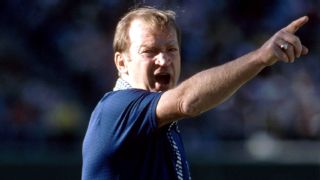|
Editor's note, this story originally ran in Feb. 6, 2016 and has been updated to reflect Coryell's Hall of Fame inclusion.  As the innovator behind the "The Greatest Show on Turf" and the head coach responsible for leading the St. Louis Rams to a win in Super Bowl XXXIV, NFL offensive guru Mike Martz had a front-row seat to the origins of that offense nearly 50 years ago. As the innovator behind the "The Greatest Show on Turf" and the head coach responsible for leading the St. Louis Rams to a win in Super Bowl XXXIV, NFL offensive guru Mike Martz had a front-row seat to the origins of that offense nearly 50 years ago.
During 12 seasons at San Diego State, former San Diego Chargers head coach Don Coryell put together an impressive 104-19-2 record, winning two Division II championships. The Aztecs had winning streaks of 31 and 21 games, completing undefeated campaigns in 1966 and 1969 during Coryell's tenure. Coryell helped lead the Aztecs from a Division II to Division I program in 1969. "How many times does a college team at halftime go to the opponent and say, 'Hey, listen, we're going to have a running clock in the second half,' " Martz said, " 'or this is going to get really ugly.' "He put so much pressure on people in the passing game, and they'd never seen it before. He started that whole thing where you threw third-down passes on first down. He just attacked you relentlessly, and there was no-holds-barred. "He had that Midas touch. Wherever he went, they just became explosive, like nothing anybody had ever seen. And it did eventually get the conservatism out of people. And they started to change. They started to embrace the passing game." Coryell will be inducted posthumously to the Pro Football Hall of Fame in Canton, Ohio on Saturday. A San Diego native, Martz was a slow-footed tight end at Mesa Junior College when Coryell's offenses were lighting up the scoreboard at San Diego State. Martz loved Coryell as a coach and badly wanted to play for him. But Martz didn't fit Coryell's system. A half dozen of Martz's other teammates were recruited to play for the Aztecs while Martz went on to play at Fresno State instead. Still, Coryell remembered him. Years later as an assistant coach at Arizona State, Martz was in his hometown on a recruiting trip and stopped by San Diego State to visit with a fellow coach. Of course, Coryell was on the practice field working out a player, and he spotted Martz about 80 yards away. "I thought, 'Oh my gosh, I'm in trouble now,'" Martz said. "I'm not supposed to be here and he's going to run me out of here. And he came walking over and said, 'Hell, Mike Martz. It's so good to see you, how you doing?' "I was flabbergasted. How could he know my name? How did he know who I was? But that was Don. He never forgot anybody. "I wanted to play for him so bad. Everybody that grew up here wanted to play for Don Coryell. That's what you wanted. I went to Fresno State, which was fine. It was a great career for me and I loved it there, but you grew up wanting to be a part of it. Because you knew they were different from what anybody had ever seen." Coryell, who died in July 2010, finished his coaching tenure with the Chargers after a 14-year career in the NFL. Martz paid homage to his mentor every season during his time with the Rams by bringing Coryell to St. Louis as an invited guest for a Rams preseason home game. Coryell went out for the pregame coin toss and interacted with players throughout the week, plus attended an event hosted by former St. Louis Cardinals players. Of course, Coryell had a lot of success on his own while serving as head coach of the St. Louis Cardinals, winning division championships in 1974 and '75. Coryell's Cardinals finished 42-27-1 over five seasons. "Everybody who played for us at the Rams understood that we do this stuff because of what this guy did," Martz said. "He created this whole system and philosophy, and we're just continuing the legacy. So when they finally got to meet him, some of the guys like Isaac [Bruce] were in awe of the guy -- and rightly so." While Coryell had success as a head coach and is known for his innovation on offense, Martz said what goes overlooked sometimes was the relationships he developed with players, and his ability to motivate and coach. "Talk to anybody that ever played for him," Martz said. "I don't care whether it was at San Diego State in 1968 or with the Chargers in his later years -- you just listen to anybody that was a coach or player on his team, and they talk about that coach with love and respect. "He was just so understated and had absolutely zero ego."
|
